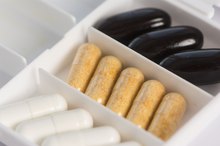Are Special K Protein Shakes Safe in Pregnancy?
Special K protein shakes are available in three flavors -- milk chocolate, strawberry and French vanilla. Kellogg’s manufactures these ready-to-drink protein shakes that are available for purchase in grocery stores nationwide. During pregnancy, Special K protein shakes may help you achieve the required protein intake needed for maternal and fetal health. Always consult with your midwife or doctor before adding nutritional supplements during pregnancy, including Special K protein shakes.
Protein During Pregnancy
Protein is a tremendously powerful nutrient during pregnancy. Both mother and baby benefit from protein intake during pregnancy. Additional demands on the mother’s body require an increase in daily protein. The Baby Center parenting website says that protein intake during pregnancy is recommended at 70 to 100 g per day. Each Special K protein shake contains 10 g of protein to supplement your diet and help you reach the recommended intake each day.
- Protein is a tremendously powerful nutrient during pregnancy.
- The Baby Center parenting website says that protein intake during pregnancy is recommended at 70 to 100 g per day.
Ingredients
How to Use Whey Protein Pills
Learn More
Special K protein shakes include a variety of vitamins and minerals. Each flavor contains different natural and artificial flavors to impart its taste. These protein shakes also contain artificial sweeteners sucralose and acesulfame potassium. Although the American Pregnancy Association states that these ingredients are deemed safe by the FDA, there is controversy over the safety of artificial sweeteners during pregnancy. The lack of long-term data due to the relatively short amount of time these ingredients have been in the food supply lead some people to question their safety. Dr. Larissa Hirsch of KidsHealth.org says that they are likely acceptable in moderation.
- Special K protein shakes include a variety of vitamins and minerals.
- Although the American Pregnancy Association states that these ingredients are deemed safe by the FDA, there is controversy over the safety of artificial sweeteners during pregnancy.
How to Use Special K Protein Shakes
Special K protein shakes, like other protein supplements, should not be used like meal replacement drinks during pregnancy. Try to get the majority of your nutrients from foods, such as lean meats, fresh fruits and vegetables. Special K protein shakes may be used in addition to meals or as a snack between meals. If you are having difficulty consuming enough protein each day due to nausea, speak with your midwife or doctor regarding treatments for the nausea that would enable your appetite to increase.
- Special K protein shakes, like other protein supplements, should not be used like meal replacement drinks during pregnancy.
- Special K protein shakes may be used in addition to meals or as a snack between meals.
Considerations
Hemp Protein and Pregnancy
Learn More
Special K protein shakes may not be appropriate for all pregnant women. Women with a history of allergies or sensitivity to artificial sweeteners should avoid the product. These shakes also contain milk, which may be unsuitable for individuals who are lactose intolerance or who have a milk allergy. Read the product label carefully, and talk with your health-care provider regarding the safety of drinking Special K protein shakes during your pregnancy.
- Special K protein shakes may not be appropriate for all pregnant women.
- These shakes also contain milk, which may be unsuitable for individuals who are lactose intolerance or who have a milk allergy.
Related Articles
References
- American Pregnancy Association: Using Artificial Sweetener During Pregnancy
- Baby Center: Protein in Your Pregnancy Diet; December 2009
- Duggleby, S. L., & Jackson, A. A. (2002). Protein, amino acid and nitrogen metabolism during pregnancy: how might the mother meet the needs of her fetus? Current Opinion in Clinical Nutrition & Metabolic Care, 5(5), 503-509.
- Stephens, L. D., McNaughton, S. A., Crawford, D., & Ball, K. (2015). Nutrition promotion approaches preferred by Australian adolescents attending schools in disadvantaged neighbourhoods: a qualitative study. BMC Pediatrics, 15(1), 61.
- Elango, R., & Ball, R. O. (2016). Protein and Amino Acid Requirements during Pregnancy. Advances in Nutrition, 7(4), 839S-844S.
- Manta-Vogli, P. D., Schulpis, K. H., Dotsikas, Y., & Loukas, Y. L. (2018). The significant role of amino acids during pregnancy: nutritional support. The Journal of Maternal-Fetal & Neonatal Medicine, (just-accepted), 1-181.
- Stephens, T. V., Payne, M., Ball, R. O., Pencharz, P. B., & Elango, R. (2014). Protein Requirements of Healthy Pregnant Women during Early and Late Gestation Are Higher than Current Recommendations. The Journal of Nutrition, 145(1), 73-78.
- Blumfield, M. L., & Collins, C. E. (2014). High-protein diets during pregnancy: healthful or harmful for offspring?
- Forsum, E., & Lönnerdal, B. (1980). Effect of protein intake on protein and nitrogen composition of breast milk. The American Journal of Clinical Nutrition, 33(8), 1809-1813.
Writer Bio
Amber Canaan has a medical background as a registered nurse in labor and delivery and pediatric oncology. She began her writing career in 2005, focusing on pregnancy and health. Canaan has a degree in science from the Cabarrus College of Health Sciences and owns her own wellness consulting business.









